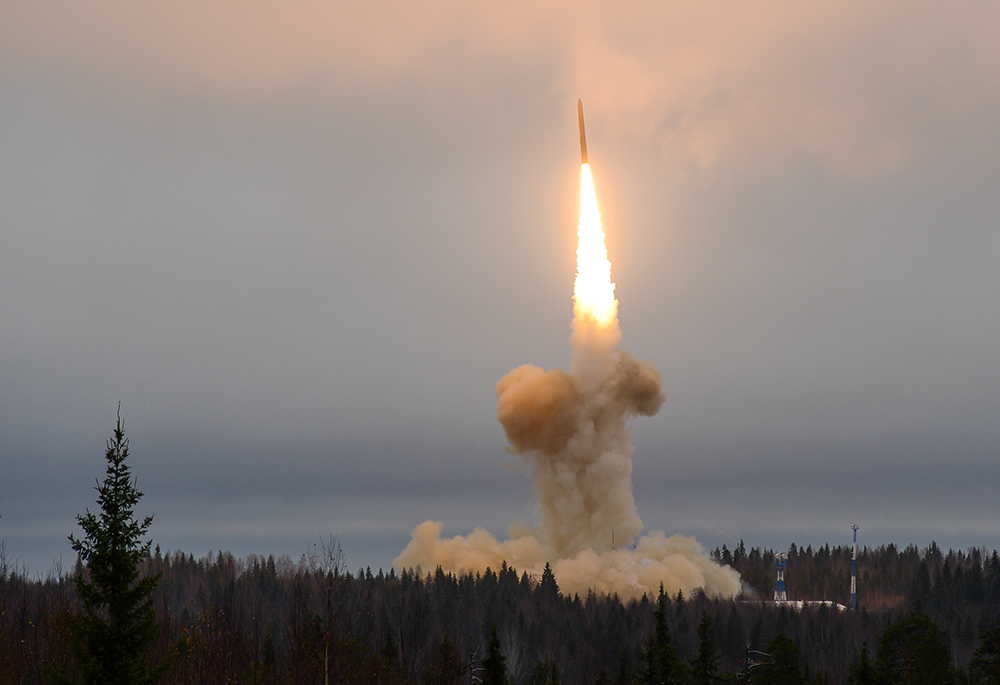
Russia launches a Topol-M silo-based intercontinental ballistic missile from the Plesetsk Cosmodrome in the Arkhangelsk Region in November 2014. (Newscom/ZUMA Press/Tass)
After Russia's February invasion of Ukraine, Russian President Vladimir Putin suggested to Western countries that their interference in the war would "lead you to such consequences that you have never encountered in your history."
Putin has since said that "there can be no winners in a nuclear war and it should never be unleashed." But concerns remain that Russia might still employ a small tactical nuclear weapon on the Ukraine battlefield. With the Ukraine war faltering, Putin earlier this week (Sept. 21) repeated veiled nuclear threats.
Even veiled suggestions are worrisome to advocates for a nuclear-free world, including Catholic sisters who monitored recent United Nations disarmament meetings ahead of the upcoming International Day for the Total Elimination of Nuclear Weapons, held annually Sept. 26.
The advocates who spoke to Global Sisters Report said this may — they emphasize may — be a moment for an issue that has hovered in the background for years to emerge and become more prominent.
"There's always the potential, and there's the always the hope," said Sr. Kathleen Kanet, a longtime peace and justice educator, a member of the Religious of the Sacred Heart of Mary and one of several sisters who attended a Sept. 12 Holy See prayer service at Holy Family Catholic Church near the United Nations the day before the start of the U.N.'s 77th General Assembly. The prayer service focused on the nuclear issue.
Global tensions over the war in Ukraine are the main reason the nuclear threat is more prominent now than it was, say, a year ago. Related concerns about Russian control of the Zaporizhzhia Nuclear Power Plant in Ukraine, which some say Russia is using as a shield for its troops and a bargaining chip in the war, are also a factor.
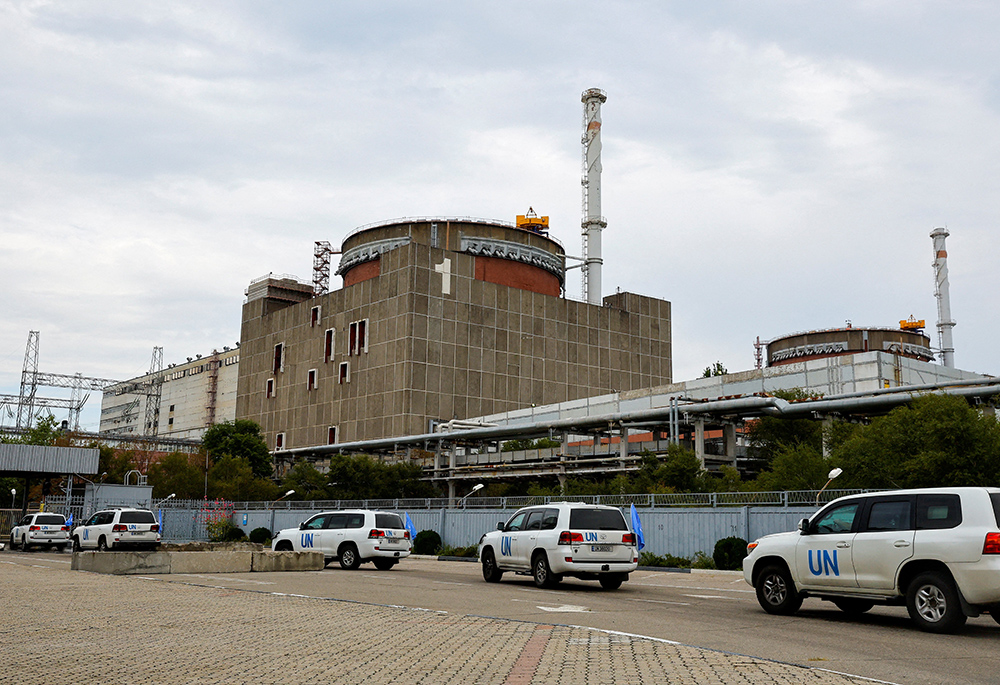
A motorcade transporting the International Atomic Energy Agency expert mission arrives at the Zaporizhzhia Nuclear Power Plant on Sept. 1 in the course of Ukraine-Russia conflict outside the Russian-controlled city of Enerhodar in eastern Ukraine. (CNS/Reuters/Alexander Ermochenko)
"It's a double-edged sword," said Ariana Smith, the executive director of the New York-based advocacy group Lawyers Committee on Nuclear Policy. "I do think this is a moment to educate the wider public on what nuclear risks are. The fact is that nuclear weapons are still in this world, even if they exist only in the background for most people day-to-day.
"But the opportunity, of course, for this renewed attention and interest obviously comes at the really high cost" of increased nuclear risk around the globe, she said.
Advocates like Kanet and Smith have prominent allies. At the Sept. 12 prayer service, Archbishop John Wester of Santa Fe, New Mexico, the author of a January pastoral letter on nuclear disarmament, said, "If we care about humanity, if we care about our planet, if we care about the God of peace and human conscience, then we must start a public conservation on these urgent questions and find a new path toward nuclear disarmament."
Earlier, U.N. Secretary-General António Guterres, who spoke Aug. 6 during ceremonies marking the 77th anniversary of the atomic bombing in Hiroshima, Japan, called for nuclear disarmament in the wake of recent international tensions.
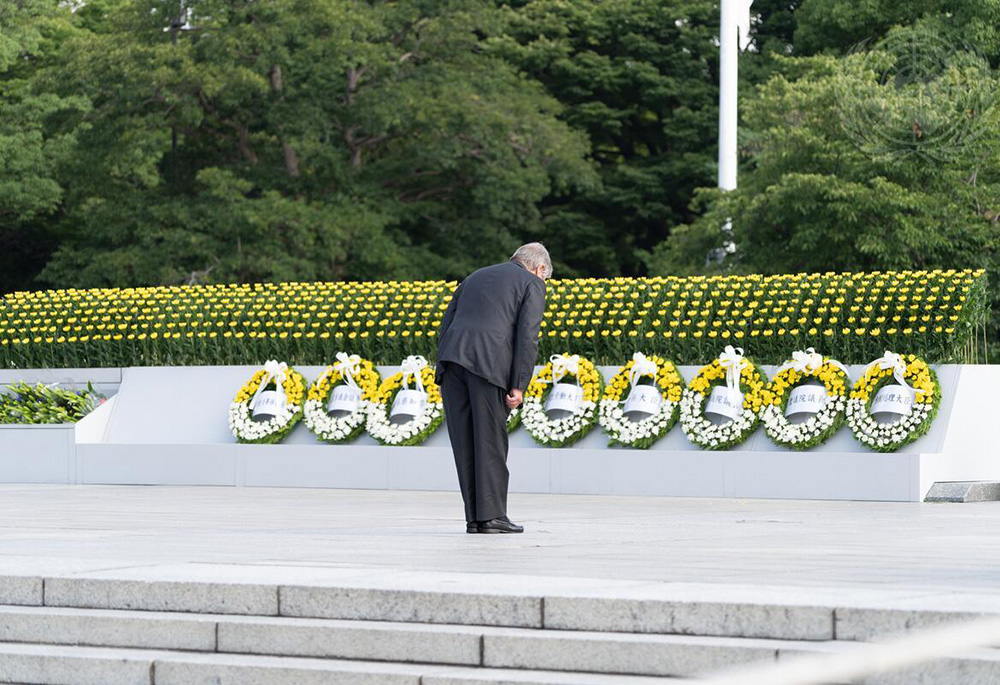
United Nations Secretary-General António Guterres pays homage to the victims of the atomic bombs during an Aug. 6 ceremony at the Peace Memorial Museum in Hiroshima during his trip to Japan reiterating his call on world leaders to urgently eliminate stockpiles of nuclear weapons. (UN Photo/Ichiro Mae)
"Take the nuclear option off the table — for good," Guterres said. "It's time to proliferate peace."
That won't be easy. Mention of the nuclear plant prompted Russia to reject language for a consensus outcome document that failed to emerge from four weeks of August meetings to strengthen the Nuclear Non-Proliferation Treaty, or NPT.
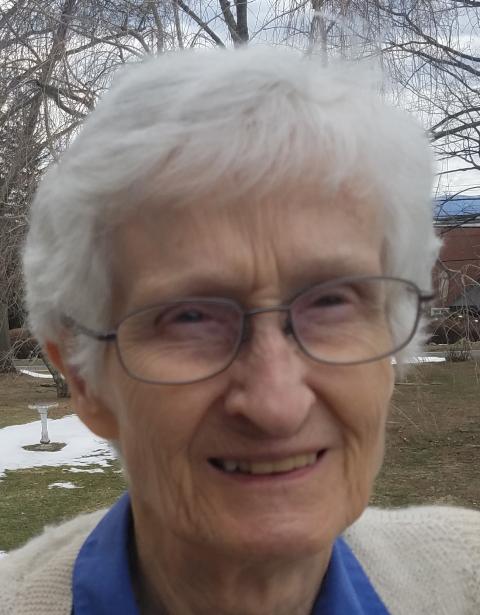
Maryknoll Sr. Jean Fallon in March 2018 (GSR file photo)
"Because of what's happening in Ukraine, it's now becoming upfront center for the whole world," said longtime peace activist Maryknoll Sr. Jean Fallon, recently named a Pax Christi Ambassador of Peace. "There are a lot of people who've never talked about, heard or are interested in nuclear weapons or nuclear anything. So, this is a 'show and tell' for them."
Even veiled threats worry Kanet and Fallon.
"[Putin's] threats are making people think, possibly changing people's minds in some way," said Kanet, who in the early 1980s co-authored a curriculum on the specter of nuclear war and is a longtime veteran of peace demonstrations.
"That's really putting the world as a hostage," Fallon said of Putin's initial comments. "The threat is still there. When I saw that, I thought, 'Oh, gosh, here we go.' It brought the whole issue to a head in one fell swoop."
Though Fallon believes the issue is now at a dangerous point, she said if the world survives the current tensions, this could be a teaching moment — "making people aware of the seriousness of nuclear weapons," she said.
"If we're going to do something about nuclear weapons, I think that this is the time to do it."
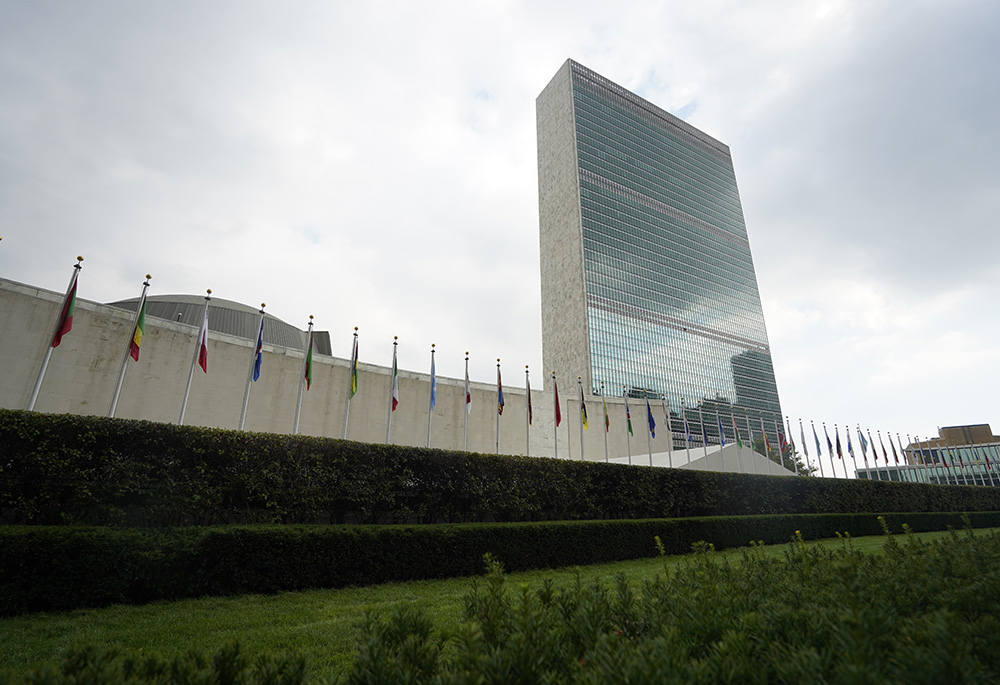
United Nations headquarters in New York City on Sept. 12 (CNS/Gregory A. Shemitz)
At the UN, frustrating power dynamics
Fallon said one issue is a problem with the United Nations itself, the principal forum for debates about global nuclear policy.
The five permanent members of the U.N. Security Council — China, France, Russia, the United Kingdom and the United States — are the largest nuclear weapons states, and each has veto power over any declaration that could risk embarrassment over one country's nuclear policy, which is what happened in the case of Russia.
"They went through that whole meeting [on the NPT], and people were happy with the document, and then Russia said, 'No,' and that was the end of it," said Fallon, who represented Maryknoll at the United Nations from 2001 to 2007.
"An urgent thing that must be done within the U.N. itself is to stop the veto of the great powers. That's an example of what happens at the U.N. when they have the power to change something but don't," she said.
Advertisement
While the major nuclear powers have opposed disarmament, at least 66 nations have either ratified or acceded to the 2017 Treaty on the Prohibition of Nuclear Weapons, a separate treaty from the NPT that calls nuclear weapons illegal and a violation of international law.
Another 20 states have signed the treaty but not yet ratified it, said the International Campaign to Abolish Nuclear Weapons, or ICAN, which won the 2017 Nobel Peace Prize for its advocacy efforts. At least five more countries will sign or ratify the treaty Sept. 22, ICAN said.
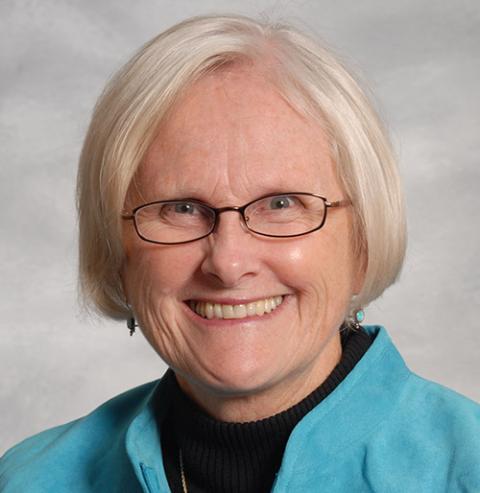
Durstyne "Dusty" Farnan (Courtesy of Durstyne Farnan)
Even with that success, current congregational representatives at the U.N. agreed that the power dynamics at the world body can be frustrating and daunting.
"It seems as if no one at the U.N., including all those people at the [NPT] treaty conference, can or could actually bring about any helpful conversation and deliberation on the situation," said Sr. Durstyne "Dusty" Farnan, an Adrian Dominican sister who represents the Dominican Leadership Conference at the U.N. and one of several sisters who attended the Sept. 12 prayer event.
"What it says to me is the ineffectiveness of the U.N. at this time, and even the treaty itself," Farnan said, adding that the failure of the NPT conference should not focus solely on Russia.
"The United States has its own incredible amount of nuclear weapons," Farnan said. And current plans to modernize U.S. weapons systems at a cost of at least $100 billion worries Farnan both for the cost and for the possibility that modernized systems pose a greater potential for "hair-trigger" risk. (Advocates favoring modernization say it would make the weapons systems safer.)
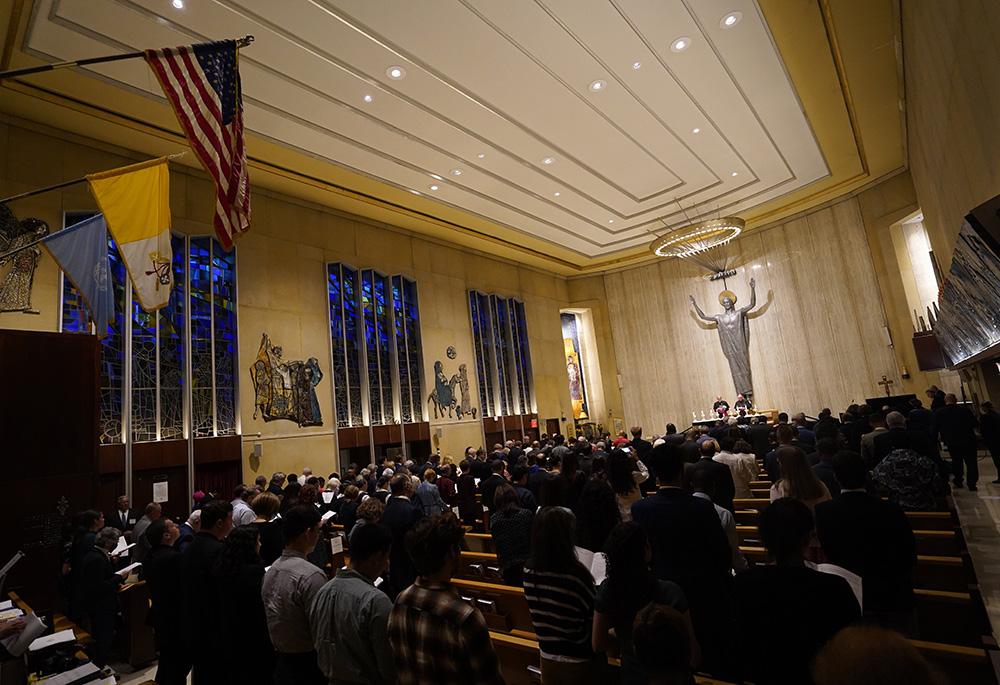
United Nations diplomats and other guests gather for a prayer service Sept. 12 at the Church of the Holy Family in New York City. The service, hosted by the Vatican's permanent observer mission to the U.N., was held on the eve of the opening of the 77th session of the U.N. General Assembly. (CNS/Gregory A. Shemitz)
"The response that we need to hear from the U.S. is: 'Why do we need to spend all this money to modernize these weapons, and why do we need all these weapons anyway?' " Farnan said. "We don't need them. If the U.S. could just begin to downsize its arsenal, I think that might help the conversation in the future."

Sr. Veronica Brand represents the Religious at the Sacred Heart of Mary at the United Nations (GSR file photo)
Beth Blissman, a lay representative for the Loretto Community, agreed, saying that while Russia may have been alone in blocking consensus on the NPT document, none of the nuclear weapons states "really came to the conference with a real will and willingness to make clear, measurable commitments to nonproliferation."
Lost in much of the discussion is the potential humanitarian catastrophe that would result from a nuclear war, said Sacred Heart of Mary Sr. Veronica Brand, who represents her congregation at the United Nations. She attended both the Sept. 12 prayer service and a side event during the NPT conference focusing on the potential for a nuclear-prompted global catastrophe.
That event, Brand said, opened her eyes "to the absolute horror of what one state launching a nuclear weapon could do, which would inevitably set off retaliation."
One recent study, reported by Nature magazine, said that more than 2 billion people could perish from a nuclear war between India and Pakistan, while more than 5 billion might die from a nuclear war between Russia and the United States.
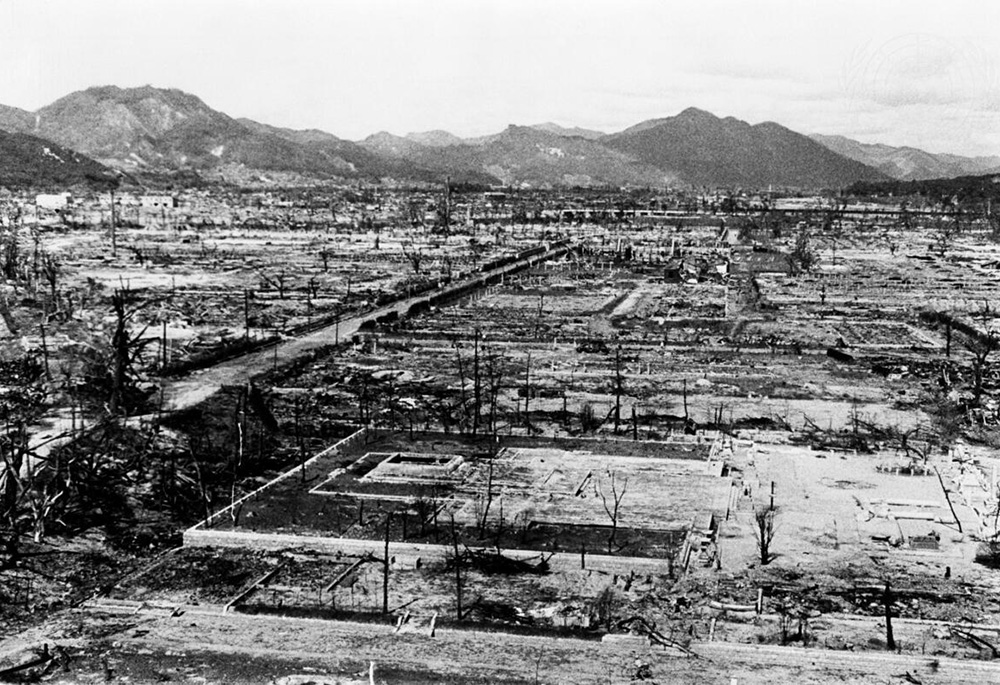
Ruins of Hiroshima, Japan, following the detonation of an atomic bomb that the United States dropped Aug. 6, 1945, during World War II (UN photo/Eluchi Matsumoto)
The sisters who work at the U.N. acknowledge there are many issues to contend with in their advocacy efforts and, as Sr. Carol De Angelo, notes, "you can't give justice to each one."
Yet at the core of many them is the need to lift up the importance of nonviolence, said De Angelo, director of the Office of Peace, Justice and Integrity of Creation for the Sisters of Charity of New York.
"That's a base, a foundation," she said, uniting themes of nuclear disarmament, the climate crisis and even the affirmation of gender equality.
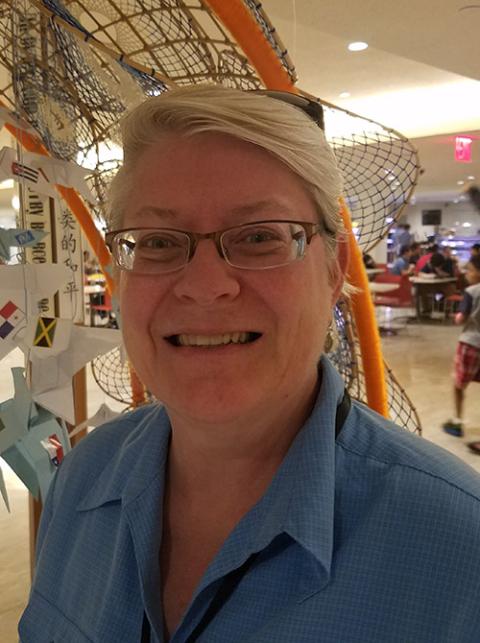
Beth Blissman, the U.N. representative for the Loretto Community, in 2017 (GSR file photo)
Blissman said the NPT talks were "yet one more example of how the U.N. operates in silos on different existential threats to humanity" and how there is need "to make some of the connections between things like the nuclear nonproliferation treaty and the climate talks."
Advocates like Blissman say nuclear disarmament would not only eliminate an existential threat to the planet, but free up resources to tackle the challenge of the climate crisis.
"We need to be thinking in a more systemic, more holistic way," she said, "and gender equity is key to these conversations, to these discussions, to the movement of humanity out of this phase [of human history] that in some ways is very juvenile, is very combative, is very conflictive, which is not the best that humanity can put forth right now."
Will young people embrace the issue?
To older peace activists like Fallon and Kanet, some of the milestones in the nuclear disarmament movement came decades ago, though activism by such groups as Plowshares, which has always had Catholic sisters in leadership roles, has continued.
As many as 1 million people converged on New York's Central Park on June 12, 1982, to support a nuclear arms freeze between the United States and the Soviet Union — an event Kanet attended with other members of her congregation and remembers fondly.
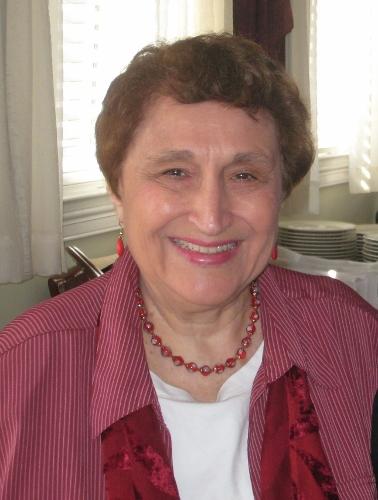
"It was such a day of hope and possibility," she said.
Fallon's peace activism stems in part from her longtime experiences working as a Maryknoll missioner in Japan and knowing atomic bomb survivors — personal experiences that left a deep impression.
Could a rally attracting hundreds of thousands in a public space like Central Park be possible now?
"As things are now, I wouldn't count on a large group of people," Fallon said. "If you've ever been at an anti-nuclear rally, there might be 200, 300 people, and that's it," she said of her recent experiences.
But there are other ways now of lifting up the issue: Online signature campaigns can "help a lot to bring to people's attention the seriousness of the problem," Fallon said.
At age 92, Fallon said her own on-the-ground activist days may be behind her. But she is eager for a new generation to embrace the nuclear issue.
Will they?
"Once they're aware of the seriousness of it, yes, they would," Fallon said, though she noted that young activists seem to be more concerned with climate change.
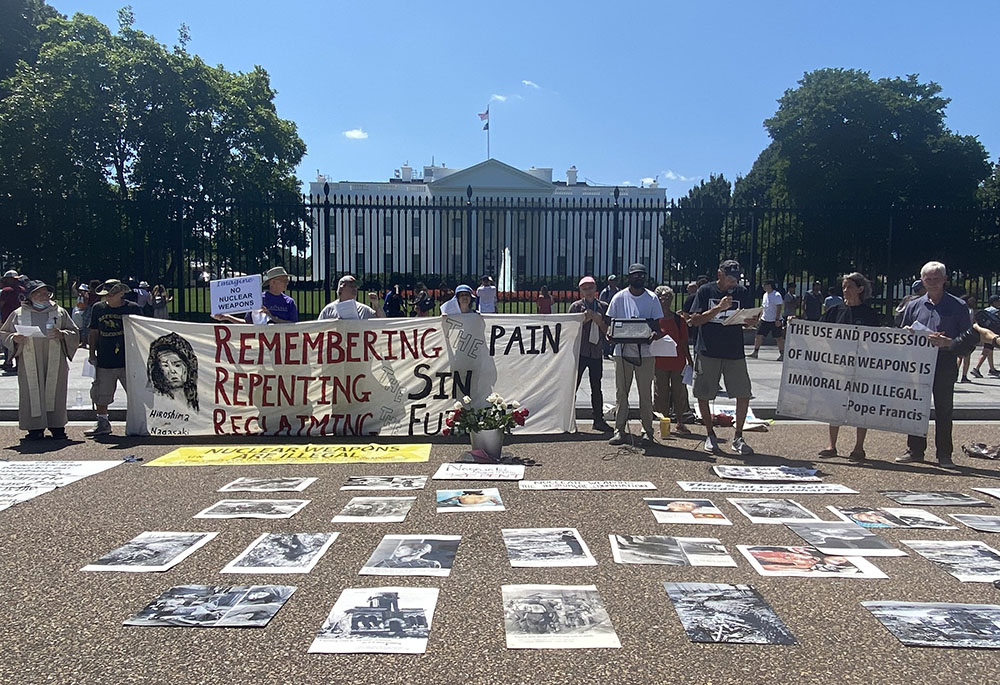
Members of several Catholic organizations gather in front of the White House Aug. 9, to pray for peace on the 77th anniversary of U.S. bombing of Nagasaki, Japan, while also remembering those who perished and survived the Aug. 6, 1945, bombing of Hiroshima. The activists called for peace through eliminating nuclear weapons and peace from environmental sins committed against the planet. (CNS/Rhina Guidos)
One of those optimistic about the possibility of increased activism and visibility is Smith of the Lawyers Committee, a group Fallon praises for keeping the issue of the threat of nuclear war in the public eye.
Like the Catholic sisters at the U.N., Smith, 32, acknowledges the challenge of competing issues for activists, and young activists in particular, to embrace.

Ariana Smith, executive director of Lawyers Committee on Nuclear Policy (Courtesy of Ariana Smith)
"It can be harder than ever to compete with all the really urgent issues the world is facing," she said. "However, it's important to see where they intersect as well and use that in our work."
Climate change and nuclear risk, she said, are "crosscutting" because "climate change increases the risk of conflict around the world in general, and conflict increases the risk of nuclear weapons becoming involved."
Smith said she believes there is "a significant group of young people working on this issue," even some focusing specifically on the intersection of climate change and nuclear disarmament.
"This is absolutely a youth-relevant issue," Smith said, "and it's garnering attention, at least in the circles of young people who are already invested in activism and advocacy at large. And there's potential for more."
The International Committee of the Red Cross reported in early 2020 that of 16,000 millennials surveyed in 16 countries, 84% said the use of nuclear weapons was never acceptable, and 54% believed "more likely than not that a nuclear attack will occur in the next decade."
At the very least, "more and more people are aware of the current stakes and the renewed possibility of the two biggest nuclear weapon states possibly engaging in a nuclear war," Smith said. And while "most experts would rightly say that the risk is still relatively small, it has also increased recently, which is not acceptable."
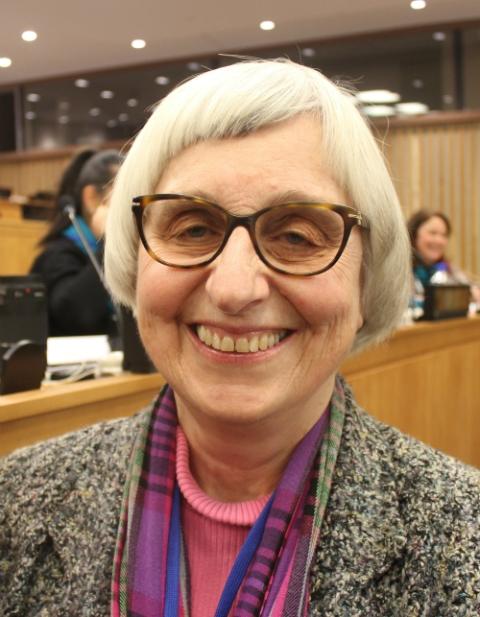
Sr. Carol De Angelo, director of the Office of Peace, Justice and Integrity of Creation for the Sisters of Charity of New York (GSR file photo)
The need to secure a more peaceful world
For those grounded in religious faith, even the thought of using nuclear weapons is not acceptable.
In a message read at a June meeting in Vienna on the Treaty on the Prohibition of Nuclear Weapons, Pope Francis reaffirmed the church's position that "the use of nuclear weapons, as well as their mere possession, is immoral." He said the possession of such weapons "leads easily to threats of their use, becoming a sort of 'blackmail' that should be repugnant to the consciences of humanity."
Breaking down "silos" is part of the process of securing a more peaceful world, say the sisters at the U.N., and more people are coming to understand that.
"There's been a real surge and really a growing consciousness," De Angelo said. "We're not there yet. I don't think we are where we want to be, but I think that there is definitely a growing movement."
Brand said a coming-together is possible in a movement that can "draw young people, can draw older people, and can enable us to make the links between climate change, between nonviolence, between human dignity and the need to address the incredible gap between rich and poor, and to promote life on and our planet into the future."
"It's making the links that I think are extremely important. It's life. It's all about life. Life in its fullness."






